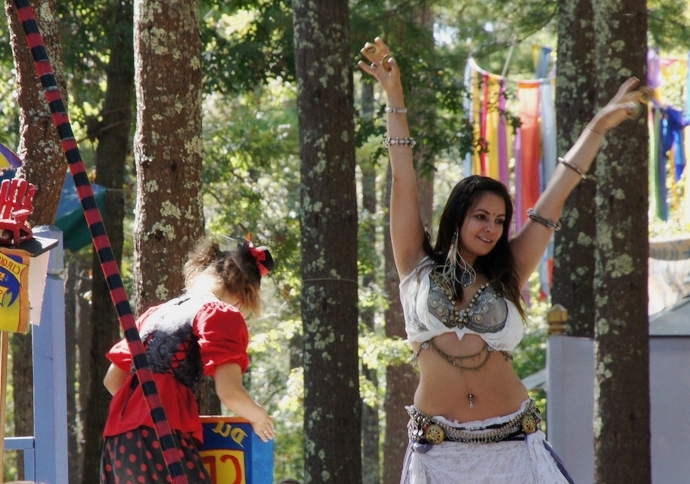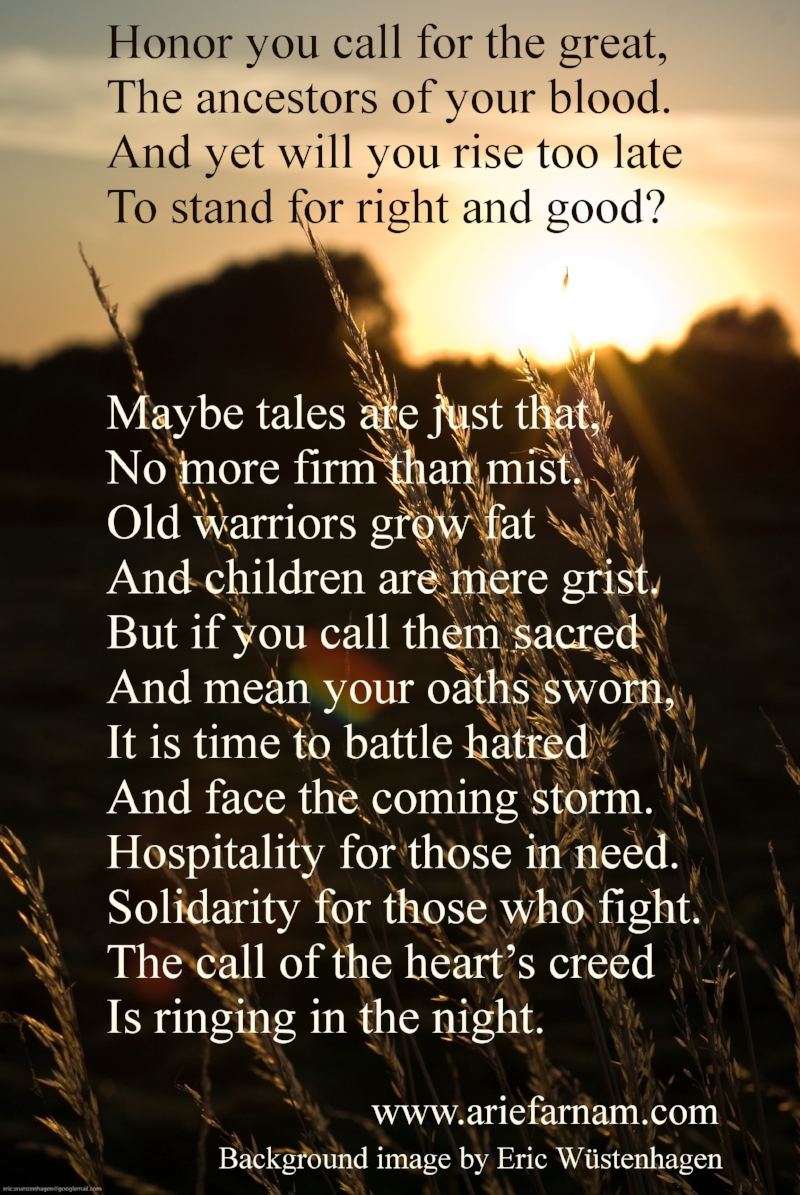When you call yourself a "gypsy"
/Pagans, new agers, beautiful beings or spirit and creativity, all of you, hear this.
I have done some very silly things in my time. When I was a young teen and I desperately wanted to be a beautiful and wise Pagan priestess and herbalist healer from Middle Earth, I mixed up inedible brews of random leaves from around my house. I forced my best friend (a boy) to sit facing me and hold a crystal on his forehead in lengthy tests of our telepathic powers.
I also talked him into training to be a "knight" by whacking a tree endlessly with a wooden sword. This last was not just silly but ultimately destructive and cruel. My friend, trying to win his medieval wannabe lady's favor, knocked all the bark off of the tree in a ring all the way around the trunk. And the tree died.
My friend went on to learn to use a sword skillfully from martial arts teachers in Japan. I spent the next twenty years learning which plants actually have medicinal properties and which are poisons or will just give you a stomach ache. Fortunately, for me and my friends, I stopped short of being stupid enough to get anyone to drink my early concoctions.
The fact remains though that we do silly things when we are inexperienced and uniformed. Some of those things are not just silly but stupid. And some of the stupid things end up hurting someone.
Creative Commons image by James Saunders
There is one silly thing going around in Pagan and other spirituality circles that I want to warn you off of. I say it as a fellow silly person. I don't come from a high preachy perch, but rather from the earth-bound, true-hearted path of one who did not always know better.
Please don't call yourself a "gypsy" unless you really are Romani. Please don't even name your pets, children, homes or objects with "gypsy" as either a noun or an adjective.
I get it. The word sounds fun. So many people use it and they mean no harm. At worst, it is silly to you in the places where you live.
I, however, live in a place where the word "gypsy" Is as harsh and dangerous a racial slur as the N-word is in the United States. In Central Europe where I live, eighty percent of Roma live in poverty, often the absolute poverty rarely seen outside of the developing world. Thirty percent of Roma in the wealthy European Union live in households with no running water.
It was only in 2008, that the schools in the European country where I live began to desegregate and Romani children started attending real schools. We are otherwise a wealthy and highly educated country, but discrimination against the Roma is still pervasive and hate crimes, both violent attacks and threats, are widespread.
Earlier this summer, a gang of ten men armed with knives attacked a Romani community in Western Ukraine, a few hundred miles from where I live. They killed one person and injured four others, including a child. When the Romani residents fled the area, journalists found bloodstained clothing scattered amid children's toys and other household items.
Where I live in the Czech Republic, 65 percent of Roma report discrimination when seeking housing and 55 percent of the non-Romani population openly say they wouldn't want a Romani neighbor, which shows that the Romani reports are probably not exaggerated. In addition, more than 50 percent of Romani children reported racist harassment and bullying in school in a European Union survey published earlier this year.
I know that people who call themselves "gypsies" in fun or even in a belief that they are thus "honoring" the free spirit and beauty of the Romani people don't mean the term the way those who attack Romani people using that word do. But it is still a mistake. It is one of those silly things that actually hurts people by accident.
Just as Native American indians do not appreciate people dressing up with feathers on their heads and waving their hand in front of their mouth to "be like Indians" even when this is meant positively, Romani people are hurt by the stereotype of the "free-spirited, sensual and cleverly tricky gypsies." They are harmed in spirit and in heart, but also eventually harmed in body as well because these stereotypes contribute to international silence and indifference when gangs of thugs attack the Roma and bureaucrats block the doors of schools and apartment buildings.
I knew much of this when I first came to live in the Czech Republic. Fortunately, I did not fall victim to this particular silly thing as a young person. I spent my twenties writing for international newspapers and magazines, often about the Roma, racism and ethnic violence in Central and Eastern Europe.
Creative Commons image by Pablo Segade
But of course, a journalist doesn't experience these events the way those targeted do. After I had lived in the Czech Republic for ten years and was married, I adopted a child. My husband and I couldn't have biological children and we were open to adoption. As it often happens in this country, the child the orphanage placed in my arms was a tiny Romani girl.
The first weeks with my daughter were some of the happiest of my life. I remember the spring rain and sunshine of that April with misty-eyed joy.
Then a month later, Neo-nazis threw three Molotov cocktails through the windows of a Romani home and one landed in the bed of a two-year-old girl. The beautiful little girl, who looked very much like my daughter, suffered terrible burns over 80 percent of her body and lost three fingers but survived after months in an induced comma and fourteen major surgeries.
The violence, discrimination and structural racism that the Roma suffer cost my daughter her first family and ended that month of naive bliss for me as well. Two years later we adopted a little boy, also of Romani background, who had already suffered racism from caregivers at an orphanage, where they told me "nobody really liked him." He was ten months old and already deeply traumatized.
Today my children are seven and nine years old. They are largely sheltered from the harsh realities of racism. My daughter once panicked when kids at school called her "black" because she thought they knew something she didn't and that she was going to turn the color black. She has a light olive complexion which is here sometimes called "black." She does love to wear flamboyant dresses and flowers in her hair, but so do many non-Romani little girls playing princess.
My son's friend from school recently told me that some boys teased my son and called him "gypsy." My son reluctantly confirmed that it was true. He looked terrified as he waited for my reaction.
My children don't really understand the many uses of the word "gypsy" yet. But like many other Roma, the first place they hear it is in the schoolyard as a racial slur. I will try to explain to them when we visit our family in America and hear people use it in a much more silly way that thee people do not mean to be hurtful. Maybe they will understand but maybe they will just learn to be quiet and keep their hurt inside.
Regardless, the silliness that accompanies the western use of the word "gypsy" spreads unhelpful stereotypes about the Roma, who are called Gypsies because historically some people believed they originated in Egypt. (They actually originated in India.)
Pagan friends, I ask you not to do this silly thing. Don't misuse the word "gypsy" with a small "g" and don't use "Gypsy" with a big "G" as an insult either (obviously). The former may seem like a minor issue to many but it would help as a show of support for the Romani people who remain one of the world's most persecuted minorities.
Thank you for understanding.
















